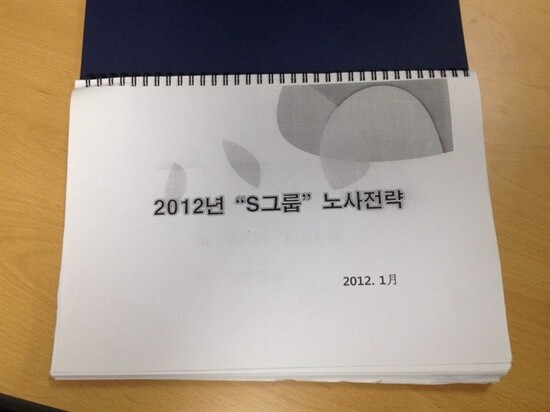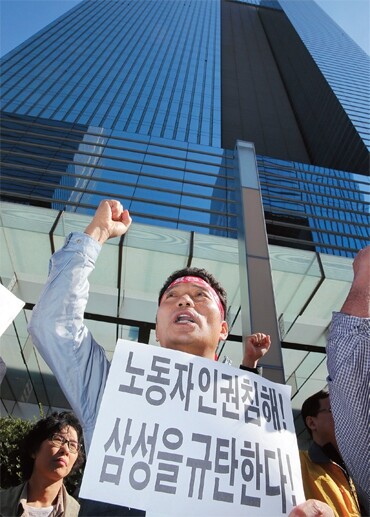hankyoreh
Links to other country sites 다른 나라 사이트 링크
ILO asks S. Korean gov’t for notification about Prosecutors’ investigation into Samsung union busting

The International Labour Organization (ILO) recommended that the South Korean government promptly notify it about the findings of the Prosecutors‘ investigation into the “S Group Labor Relations Strategy,” a document about union busting by the Samsung Group. The ILO also recommended that the government devise ways to better guarantee the freedom of association for workers who are indirectly employed. This is the first time that the ILO has make recommendations about Samsung’s suppression of labor unions.
During the 329th session of the ILO Governing Body, which was held in Geneva, Switzerland, on Mar. 22, the ILO adopted an interim report on a complaint that the Korean Metal Workers’ Union (KMWU), the Korean Confederation of Trade Unions (KCTU), the International Trade Union Confederation (ITUC) and the IndustriALL Global Union filed against Samsung with the freedom of association committee in 2013. “Samsung adopted a ‘no-union’ policy involving subcontractors and indirect employment, and Samsung Electronics Service and its subcontractors discriminated against, mistreated and threatened union members,” the organizations said in their complaint.

“Samsung used the ‘S Group Labor Relations Strategy’ document to adopt a ‘no-union’ policy and to trample the freedom of association,” argued the organizations who filed the complaint. This document lays out disciplinary measures against Jo Jang-hee, vice director of KMWU’s Samsung chapter, who attempted to set up a union at Samsung Everland in 2012; the collection of evidence against other ‘troublesome people’ who tried to start unions; and methods of setting up pro-company unions and reaching collective agreements with them.
“We emphasize the seriousness of the complaint and ask that the government continue to promptly inform us of the results of the Prosecutors‘ investigation and that it take the necessary measures to fully guarantee workers’ rights to set up and join labor organizations as they choose,” the committee said in its report about the document.
The document in question was made public by Shim Sang-jung, a lawmaker with the Justice Party, in Oct. 2013. Shortly after the document was released, Samsung acknowledged creating the document “for internal review in the group,” but a week later it changed its story and denied having created it. South Korea‘s Ministry of Employment and Labor and the Prosecutors accepted Samsung’s argument and found that the document had not been created by Samsung when they released the results of their investigation in Nov. 2014. But in Dec. 2016, the Supreme Court concluded that Samsung had indeed created the document in a lawsuit that Jo filed about his wrongful termination. The court based this finding on the fact that Samsung had initially stated that it was an internal document, that the document was very detailed and that the recommendations in the document were actually implemented.
Though the Supreme Court acknowledged that the document was created by Samsung (admittedly in an administrative lawsuit) and though the ILO has addressed the seriousness of the document‘s content, the Ministry of Employment has been slow to reopen the case. An official at the Ministry only said the government would consider a new investigation if there was a change of circumstances - such as the original plaintiff requesting a new investigation and submitting additional evidence.
The ILO committee also concluded that the suppression of the KMWU’s Samsung Electronic Service branch constituted “serious anti-union actions.” When workers for Samsung Electronics Service set up a labor union in 2013, the subcontractors for Samsung Electronics Service that were technically their employers took steps such as closing their doors, not giving the union members work or launching targeted audits. During this process, Choi Jong-beom and Yeom Ho-seok ended their own lives to protest the suppression of the union.
“The fact that the suppression and destruction of the labor union subjected the union members to financial and psychological suffering, causing Choi Jong-beom and Yeom Ho-seok to end their lives, and that this suppression occurred around the country prompt us to express our serious concern. The government testified that it had taken action about the illegal activity after an investigation of the unfair labor actions, but it did not provide detailed results of the investigation into the numerous examples of suppression highlighted by the unions,” the committee said.
The committee urged the South Korean government to devise plans for guaranteeing the workers’ freedom of association. Though indirect employment is pervasively used through outsourcing and employment agencies, indirectly employed workers are unable to negotiate with the original contractor. Furthermore, the original contractor frequently infringes upon such workers’ freedom of association by ending contracts with subcontractors when unions are set up.
“Even if it has not been demonstrated that the workers at Samsung Electronics Service corresponded to ‘illegal dispatching’ as defined by South Korean law, the government must still look into whether there are any obstacles to all indirectly employed workers effectively enjoying the right to organize and the right to collective bargaining. We ask the government to provide information about the measures it has taken to develop an appropriate mechanism for better protecting subcontractor workers’ freedom of association and their right to collective bargaining through deliberation with labor organizations and after taking into adequate consideration various obstacles to the freedom of association,” the committee said.
“In regard to legal matters that have already concluded, we will let them know that they have concluded, and we will accept any of the recommendations that are acceptable,” a senior official at the Ministry of Employment said during a telephone conversation with the Hankyoreh on Mar. 24.
By Park Tae-woo, staff reporter
Please direct questions or comments to [english@hani.co.kr]

Editorial・opinion
![[Editorial] Intensifying US-China rivalry means Seoul must address uncertainty with Beijing sooner than later [Editorial] Intensifying US-China rivalry means Seoul must address uncertainty with Beijing sooner than later](https://flexible.img.hani.co.kr/flexible/normal/500/300/imgdb/original/2024/0517/8117159322045222.jpg) [Editorial] Intensifying US-China rivalry means Seoul must address uncertainty with Beijing sooner than later
[Editorial] Intensifying US-China rivalry means Seoul must address uncertainty with Beijing sooner than later![[Column] When ‘fairness’ means hate and violence [Column] When ‘fairness’ means hate and violence](https://flexible.img.hani.co.kr/flexible/normal/500/300/imgdb/original/2024/0516/7417158465908824.jpg) [Column] When ‘fairness’ means hate and violence
[Column] When ‘fairness’ means hate and violence- [Editorial] Yoon must stop abusing authority to shield himself from investigation
- [Column] US troop withdrawal from Korea could be the Acheson Line all over
- [Column] How to win back readers who’ve turned to YouTube for news
- [Column] Welcome to the president’s pity party
- [Editorial] Korea must respond firmly to Japan’s attempt to usurp Line
- [Editorial] Transfers of prosecutors investigating Korea’s first lady send chilling message
- [Column] Will Seoul’s ties with Moscow really recover on their own?
- [Column] Samsung’s ‘lost decade’ and Lee Jae-yong’s mismatched chopsticks
Most viewed articles
- 1For new generation of Chinese artists, discontent is disobedience
- 2[Editorial] Transfers of prosecutors investigating Korea’s first lady send chilling message
- 3[Exclusive] Unearthed memo suggests Gwangju Uprising missing may have been cremated
- 4[Editorial] Intensifying US-China rivalry means Seoul must address uncertainty with Beijing sooner t
- 5S. Korea “monitoring developments” after report of secret Chinese police station in Seoul
- 6N. Korean media upgrades epithet for leader’s daughter from “beloved” to “respected”
- 7Yoon says concern about biased diplomacy is being incited by “communist totalitarian forces”
- 8[Column] US troop withdrawal from Korea could be the Acheson Line all over
- 9Xi, Putin ‘oppose acts of military intimidation’ against N. Korea by US in joint statement
- 1060% of young Koreans see no need to have kids after marriage